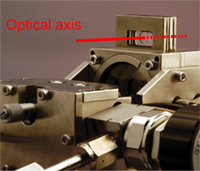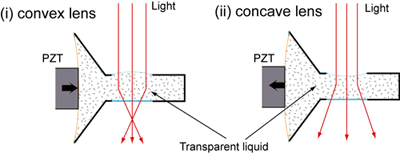Variable-Focus Lens with 1-kHz Bandwidth
Summary
High-speed focusing is required in many application fields as a result of the recent development and widespread use of optical devices. For example, rapid axial scanning of the focal plane is important for confocal scanning microscopes to acquire three-dimensional information of objects at high speed. In these application fields, since millisecond-order scanning is required, we assume that 1-kHz bandwidth is adequate for our proposed high-speed focusing device.
However, no previous focusing mechanisms have yet attained a 1-kHz bandwidth. For example, the axial tracking mechanism of optical disks, which is one known fast-focusing system, has a first resonant frequency of around 100 Hz.
To solve this problem, we proposed a variable-focus lens with 1-kHz bandwidth. The lens transforms its shape rapidly using the liquid pressure generated by a piezo stack actuator. This mechanism also includes a built-in motion amplifier with high bandwidth to compensate for the short working range of the piezo stack actuator. Prototypes have been developed to validate the proposed design. A 1-kHz bandwidth of the lenses was confirmed by measuring the frequency responses. Refractive power ranging from -1/167 to 1/129 mm-1 and a maximum resolution of 12.3 cycles/mm were attained.


References
- Hiromasa Oku, Koichi Hashimoto, and Masatoshi Ishikawa: Variable-focus lens with 1-kHz bandwidth, Optics Express, vol. 12, No. 10, pp. 2138-2149, 2004.
- Hiromasa OKU, and Masatoshi ISHIKAWA: A Variable-Focus Lens with 1kHz Bandwidth Applied to Axial-Scan of A Confocal Scanning Microscope, Proc. of the 16th Annual Meeting of the IEEE Lasers & Electro-Optics Society (LEOS) 2003 (Tucson, U.S.A., Oct. 26-30, 2003) (IEEE Catalog Number: 03CH37460, ISSN: 1092-8081), vol. 1, pp. 309-310. [PDF (459K)] *IEEE
*IEEE © 2001-2005 IEEE. Personal use of this material is permitted. However, permission to reprint/republish this material for advertising or promotional purposes or for creating new collective works for resale or redistribution to servers or lists, or to reuse any copyrighted component of this work in other works must be obtained from the IEEE.



